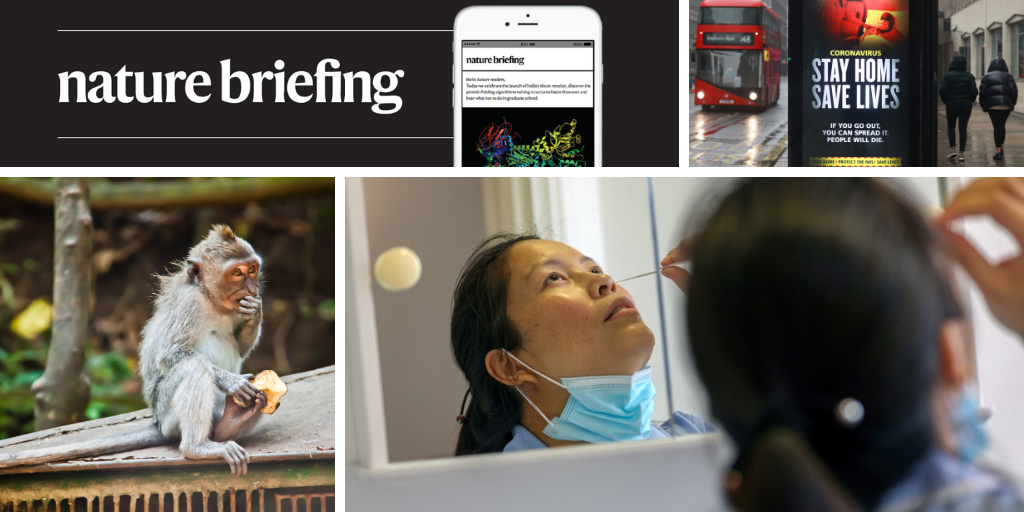Play all audios:
Hello _Nature _readers, would you like to get this Briefing in your inbox free every day? Sign up here COVID REINFECTIONS APPEAR RARE, BUT RISKY Most people who catch and recover from
COVID-19 appear to be immune for at least five months afterwards. Interim results from a study of more than 20,000 health-care workers in the United Kingdom have found that repeat infections
are unusual — they occurred in fewer than 1% of about 6,600 participants who had already had COVID-19. The handful of people who do become reinfected can carry high levels of the virus in
their nose and throat. Such viral loads have been associated with a high risk of transmitting the virus to others. Nature | 4 min read MORE THAN 100,000 Deaths in the United Kingdom from
COVID-19. The grim milestone was reached following record numbers of daily deaths. The country has one of the worst coronavirus mortality rates in the world, at 151 per 100,000 people. (The
Guardian | 6 min read) FOUR TOP PRIORITIES FOR THE US PRESIDENT Control COVID. Move forward boldly on climate change. Restore the role of science in government. And restore a shared sense of
reality itself. Incoming US president Joe Biden faces a laundry list of challenges, any of which might seem insurmountable. _Scientific American_ offers its top four recommendations on
where to focus first, and how to achieve these goals. Scientific American | 4 6-8 min reads THIEVING MONKEYS CAN SPOT TOP-DOLLAR ITEMS Macaques at the ancient Uluwatu temple in Bali judge
which items are best to steal to earn the highest reward. Studying the monkeys’ interactions over 273 days, researchers found that macaques demanded more or higher quality food to return
items such as wallets, prescription glasses and mobile phones than they did for lower value items, such as hairpins and camera bags. The longest ransom period lasted 25 minutes, including 17
minutes of negotiation between the tourist, temple staff and thief. Guardian | 2 min read Reference: _Philosophical Transactions of the Royal Society B _paper FEATURES & OPINION TAKE A
SHORT WALK ON A CUBE-SHAPED EARTH Ever wondered how to work out the shortest path from A to B if you lived on a cube? A tetrahedron? Thankfully, we have mathematicians to explore these
parallel worlds. For solids made up of the same regular polygonal faces, the shortest straight path back to any point always passes through a corner where edges meet. Except for the
dodecahedron, which can have infinitely many straight paths that start and end on the same vertex without passing through any others. Includes some do-at-home exercises to expand your mind.
Quanta | 7 min read INSECTS FACE ‘DEATH BY A THOUSAND CUTS’ In the introduction to a special issue of _PNAS _that throws light on insect decline, ecologists do not mince words: “Nature is
under siege,” they write. “Most biologists agree that the world has entered its sixth mass extinction event.” In a bid to provide a scientifically grounded assessment of insect population
trends, the journal offers 11 papers that delve into every aspect of the issue. One of the challenges is going beyond “the overwhelming sense that something sinister is afoot” and gathering
clear, comprehensive data on insect abundances over time. There are only a handful of long-term monitoring studies of insect populations. So entomologists have turned to plumbing other
historical data for signals of change. PNAS special issue introduction | 30 min read & PNAS feature | 15 min read QUOTE OF THE DAY “The people who made it were fully modern, they were
just like us.” A striking painting of a Sulawesi warty pig (_Sus celebensis_) appears to be the oldest known representational work of art in the world, says archaeologist Maxime Aubert. It’s
at least 45,500 years old, based on Uranium-series isotope dating. (BBC | 4 min read)Reference: _ScienceAdvances _paper

